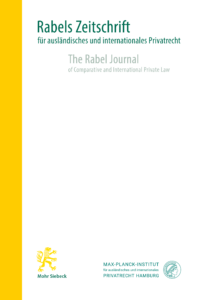Out now: RabelsZ, Volume 88 (2024), Issue 2
 The latest issue of RabelsZ has just been released. It contains the following contributions which are also available open access:
The latest issue of RabelsZ has just been released. It contains the following contributions which are also available open access:
OBITUARY
Holger Fleischer, Heike Schweitzer: Ernst-Joachim Mestmäcker – † 22 April 2024, pp. 215–222, DOI: https://doi.org/10.1628/rabelsz-2024-0033
ESSAYS
Klaus Ulrich Schmolke: Das Prinzip der beschränkten Gesellschafterhaftung – Ein Streifzug durch die Debatten- und Argumentationsgeschichte, pp. 223–277, DOI: https://doi.org/10.1628/rabelsz-2024-0022
The Concept of Limited Shareholder Liability – A Walk Through History’s Debates and Lines of Argument. Today, the concept of limited shareholder liability is considered a core feature of the modern corporation. And indeed, limited liability has been continuously provided for in the corporate (and limited partnership) laws of western jurisdictions since the 19th century. However, limited liability is not such a matter of course as it is widely perceived today. Rather, it took tough disputes and hard-fought debates before the legislators of the major European jurisdictions of the time were able to bring themselves to provide for limited shareholder liability without tying it to prior state approval. Even after this breakthrough, the debate about the legitimacy and scope of limited liability flared up time and again. This is particularly true for the close corporation, in which the shareholders also exercise control over the management of the business. This article traces the historical dimension of the transnational debate and evaluates the arguments for and against limited shareholder liability that have been put forward over time. The insights gained thereby provide a basis for analysing and evaluating the currently revived criticism of limited shareholder liability.
Sandra Hadrowicz: Natural Restitution in a Comparative Legal Perspective –
An Underappreciated Remedy or an Unnecessary Relic?, pp. 278–306, DOI: https://doi.org/10.1628/rabelsz-2024-0030
Natural restitution is one of the permissible methods for remedying damage in numerous legal orders. However, this form of compensation is much less frequently used in practice than monetary compensation. While monetary compensation is a universally found method of reparation in major legal orders, the issue is more complex when it comes to natural restitution. In some countries (e. g. England, France, the Netherlands), natural restitution is used only by way of exception, in specific cases. In others (e. g. Poland), despite the injured party being given the right to choose the method of reparation, natural restitution is very rarely requested by injured parties. Even more intriguingly, in jurisdictions where natural restitution is theoretically upheld as a principle – including Germany, Austria, Portugal, and Spain – its actual adoption by courts remains relatively rare. The question then arises: Have courts and victims come to undervalue natural restitution or even forgotten of its existence? Or, conversely, does it represent an obsolete or unnecessary element of compensation law?
Domenico Damascelli: Determining the Applicable Law in Matrimonial Property Regimes –
On the Interpretation of Article 26 Regulation (EU) No 2016/1103 in the Absence of Choice-of-law and Common Habitual Residence, pp. 307–324, DOI: https://doi.org/10.1628/rabelsz-2024-0032
Wishing to remain faithful to the alleged principle of immutability of the law governing matrimonial property regimes, the literature interprets Art. 26 para. 1 Regulation (EU) No 2016/1103 such that if the spouses have their habitual residence in different States at the time of marriage, it is necessary to wait for a period of time to ascertain whether they will move it to the same State. If so, only the law of that State is to apply (retroactively); if not, one of the other two laws indicated in Art. 26 is to apply (once and for all). This position gives rise to uncertainty in the determination of the applicable law and is contradicted by literal, systematic and teleological interpretations of the Regulation, which show that, in the absence of a common habitual residence, the law governing the matrimonial property relationships is, depending on the circumstances, the one provided for in letters b or c of para. 1 of Art. 26. However, this law may change the moment the existence of a first common habitual residence is ascertained, regardless of whether it was established immediately, shortly, or long after the conclusion of the marriage.
María Mercedes Albornoz: Private International Law in Mexico’s New National Code of Civil and Family Procedure, pp. 325–354, DOI: https://doi.org/10.1628/rabelsz-2024-0031
In June 2023, Mexico enacted a National Code of Civil and Family Procedure that includes private international law provisions on procedural matters. The adoption of this Code constitutes a landmark reform in the Mexican legal system, modernizing and, for the first time, unifying civil and family procedural laws across the country. The Code’s primary objectives are to streamline legal processes, enhance judicial efficiency, and promote consistency in civil and family litigation. This article contains a study of the main rules that adjust the goals of the Code to cross-border cases. Some of those rules introduce significant innovations compared with previous bodies of procedural legislation in force in Mexico. It sets direct rules for international jurisdiction as well as novel provisions on foreign law, rules on international cooperation and recognition and enforcement of foreign judgments, and provisions on international child abduction. Furthermore, the Code promotes digital justice and thus expressly allows and promotes the use of technological resources in international cooperation. All these rules are expected to improve access to justice in private international law cases.
MATERIALS
Jürgen Samtleben: Mexiko: Nationales Zivil- und Familienprozessgesetzbuch 2023 (Auszug) [Mexico: National Code of Civil and Family Procedures 2023 (German Translation, Excerpt)], pp. 355–378, DOI: https://doi.org/10.1628/rabelsz-2024-0021
BOOK REVIEWS
As always, this issue also contains several reviews of literature in the fields of private international law, international civil procedure, transnational law, and comparative law (pp. 379–421).